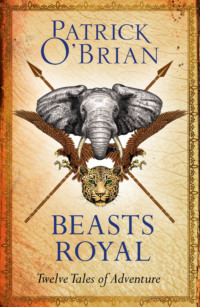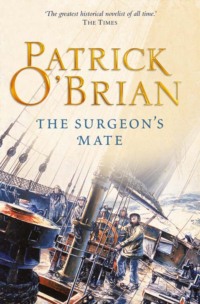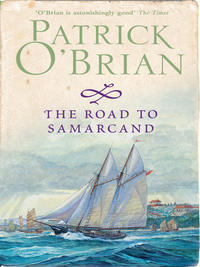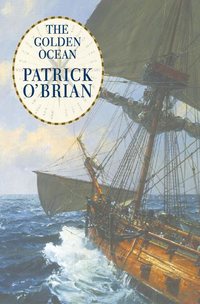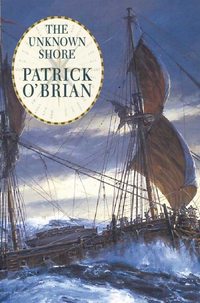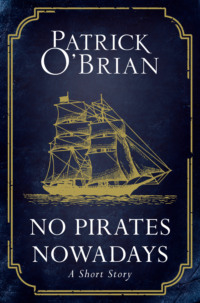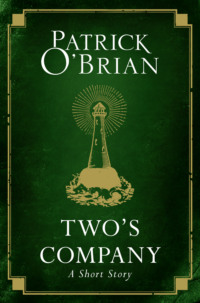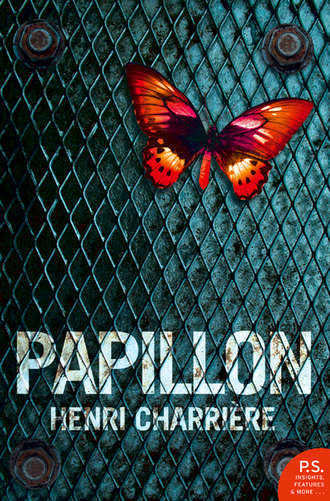
Полная версия
Papillon
‘Mainsail and jib.’
‘This is a heavy boat: it’ll stand two jibs – a staysail and an outer jib to keep her bows well up. Go out of the river with everything set. There are always heavy seas at the mouth there, and you want to take them head on. Make your friends lie down in the bottom to keep her steady and get a good grip on the tiller. Don’t tie the sheet to your leg, but pass it through that fairlead and hold it with a turn round your wrist. If you see that the wind and a heavy sea are going to lay you right over, let everything go and you’ll straighten up right away. If that happens, don’t you stop, but let the mainsail spill the wind and carry right on with the jib and staysail full. When you’re out in the blue water you’ll have time enough to put it all to rights – not before that. Do you know your course?’
‘No. All I know is that Venezuela and Colombia lie north-west.’
‘That’s right; but take care not to be forced back on shore. Dutch Guiana, on the other side of the river, hands escaped men back, and so does British Guiana. Trinidad doesn’t, but they make you leave in a fortnight. Venezuela returns you, after you’ve worked on the roads for a year or two.’
I listened as hard as I could. He told me he went off from time to time, but since he was a leper everybody sent him away at once. He admitted he had never been farther than Georgetown, in British Guiana. His leprosy could only be seen on his feet, which had lost all their toes. He was barefoot. Toussaint told me to repeat all the advice I had been given, and I did so without making a mistake. At this point Jean sans Peur said, ‘How long ought he to sail out to sea?’
I answered first, ‘I’ll steer north-north-east for three days. Reckoning the leeway that’ll make dead north. Then the fourth day I’ll head north-west, which will come to true west.’
‘That’s right,’ said the leper. ‘Last time I only stood out two days, so I ended up in British Guiana. With three days standing on, you’ll go north past Trinidad or Barbados, and then you go right by Venezuela without noticing it and land up in Curaçao or Colombia.’
Jean sans Peur said, ‘Toussaint, what did you sell your boat for?’
‘Three thousand,’ said Toussaint. ‘Was that dear?’
‘No, that wasn’t why I asked. Just to know, that’s all. Can you pay, Papillon?’
‘Yes.’
‘Will you have any money left?’
‘No. That’s all we’ve got – exactly the three thousand my friend Clousiot has on him.’
‘Toussaint,’ said Jean sans Peur, ‘I’ll let you have my revolver. I’d like to help these guys. What’ll you give me for it?’
‘A thousand francs,’ said Toussaint. ‘I’d like to help them too.’
‘Thanks for everything,’ said Maturette, looking at Jean sans Peur.
‘Thanks,’ said Clousiot.
Now I was ashamed of having lied and I said, ‘No. I can’t take it. There’s no reason why you should give us anything.’
He looked at me and said, ‘Yes, there is a reason all right. Three thousand francs is a lot of money; but even so, Toussaint’s dropping two thousand at least on the deal, because it’s a hell of a good boat he’s letting you have. There’s no reason why I shouldn’t do something for you too.’
And then something very moving happened. La Chouette put a hat on the ground and the lepers began throwing notes or coins into it. Lepers appeared from everywhere, and every one of them put something in. I was overcome with shame. Yet it just wasn’t possible to say I still had money left. Christ, what was I to do? Here was this great-hearted conduct and I was behaving like a shit. I said, ‘Please, please don’t sacrifice all this.’ A coal-black Negro, terribly mutilated – two stumps for hands, no fingers at all – said, ‘We don’t use the money for living. Don’t be ashamed to take it. We only use it for gambling or for stuffing the leper-women who come over from Albina now and then.’ What he said was a relief to me and it stopped me confessing I still had some money.
The lepers had boiled two hundred eggs. They brought them in a wooden box with a red cross on it. It was the box they had had that morning with the day’s medicines. They also brought two live turtles weighing at least half a hundredweight each, carefully laid on their backs, tobacco in leaves and two bottles full of matches and strikers; a sack of at least a hundredweight of rice, two bags of charcoal; the Primus from the infirmary and a wicker bottle of paraffin. The whole community, all these terribly unfortunate men, felt for us; they all wanted to help us succeed. Anyone would have said this was their escape rather than ours. We hauled the boat down near to the place where we had landed. They counted the money in the hat: eight hundred and ten francs. I only had to give Toussaint one thousand two hundred. Clousiot passed me his charger. I opened it there in front of everybody. It held a thousand-franc note and four five hundreds. I gave Toussaint one thousand five hundred. He gave me three hundred change and then he said, ‘Here. Take the revolver – it’s a present. You’re staking everything you’ve got, and it mustn’t go wrong at the last moment just for want of a weapon. I hope you won’t have to use it.’
I didn’t know how to say thank you, to Toussaint first and then to all the others. The medical orderly had put up a little tin with cotton-wool, alcohol, aspirin, bandages, iodine, a pair of scissors and some sticking-plaster. Another leper brought two slim, well-planed pieces of wood and two strips of antiseptic binding still in its packet, perfectly new. They were a present so that I could change Clousiot’s splints.
About five it began to rain. Jean sans Peur said, ‘You’re lucky. There’s no danger of your being seen, so you can get off right away and gain at least half an hour. That way you’ll be nearer the mouth when you start again at half-past four in the morning.’
‘How shall I know the time?’ I asked him.
‘The tide’ll tell you, coming in or out.’
We launched the boat. It was not like the canoe at all. Even with us and all our things aboard, the gunwale was a good eighteen inches from the water. The mast, wrapped in the sail, lay flat fore and aft, because we were not to put it up until we were about to run out of the river. We shipped the rudder, with its safety-bar and tiller, and put a pad of creepers for me to sit on. We made a comfortable place in the bottom of the boat with the blankets for Clousiot, who had not wanted to have his bandages changed. He lay at my feet, between me and the water-barrel. Maturette was in the bottom too, but up forward. Straight away I had a feeling of safety and solidity that I had never had in the canoe.
It was still raining. I was to go down the middle of the river, but rather to the left, over on the Dutch side. Jean sans Peur said, ‘Good-bye. Push off quick.’
‘Good luck,’ said Toussaint, and he gave the boat a great shove with his foot.
‘Thanks, Toussaint. Thanks, Jean. Thanks, everybody, thanks a thousand times over!’ And we vanished at great speed, swept along by the ebb-tide that had begun quite two and a half hours ago and that was now running at an unbelievable pace.
It rained steadily: we couldn’t see ten yards in front of us. There were two little islands lower down, so Maturette leant out over the bows, staring ahead so we shouldn’t run on their rocks. Night fell. For a moment we were half caught in the branches of a big tree that was going down the river with us, but fortunately not quite so fast. We quickly got free and carried on at something like twenty miles an hour. We smoked: we drank rum. The lepers had given us half a dozen of those straw-covered Chianti bottles, but filled with tafia. It was odd, but not one of us mentioned the hideous mutilations we had seen among the lepers. The only thing we talked about was their kindness, their generosity, their straightness and our good luck in having met the Masked Breton, who took us to Pigeon Island. It rained harder and harder and I was wet through: but those woollen jackets were such good quality they kept you warm even when they were soaked. We were not cold. The only thing was my hand on the tiller – the rain made it go stiff.
‘We’re running at more than twenty-five miles an hour now,’ said Maturette, ‘How long do you think we’ve been gone for?’
‘I’ll tell you,’ said Clousiot. ‘Just a moment. Three and a quarter hours.’
‘Are you crazy, man? How can you possibly tell?’
‘I’ve been counting ever since we left and at each three hundred seconds I’ve torn off a piece of cardboard. There’re thirty-nine bits now. At five minutes a go, that makes three hours and a quarter. Unless I’ve got it wrong, in fifteen or twenty minutes we shan’t be running down any more, but going back to where we came from.’
I thrust the tiller over to my right to slant across the stream and get into the bank on the Dutch side. Before we reached the shore the current had stopped. We were no longer going down; and we weren’t going up, either. It was still raining. We no longer smoked; we no longer talked – we whispered. ‘Take the paddle and shove.’ I paddled too, holding the tiller wedged under my right leg. Gently we came up against the bush: we seized branches and pulled, sheltering beneath them. We were in the darkness of the vegetation. The river was grey, quite covered with thick mist. If we had not been able to rely upon the ebb and flow of the tides, it would have been impossible to tell where the sea lay and where the landward river.
Right Out and Away
The flood-tide would last six hours. Then there was the hour and a half to wait for the ebb. I should be able to sleep for seven hours, although I was very much on edge. I had to get some sleep, because once out at sea, when should I be able to lie down? I stretched out between the barrel and the mast; Maturette laid a blanket over the thwart and the barrel by way of a cover, and there in the shelter I slept and slept. Dreams, rain, cramped position – nothing disturbed that deep, heavy sleep.
I slept and slept until Maturette woke me. ‘Papi, we think it’s time, or just about. The ebb has been running a good while.’
The boat had turned towards the sea and under my fingers the current raced by. It was no longer raining, and by the light of a quarter moon we could distinctly see the river a hundred yards in front of us, carrying trees, vegetation and dark shapes upon its surface. I tried to distinguish the exact place where the sea and river met. Where we were lying there was no wind. Was there any out in the middle? Was it strong? We pushed out from under the bush, the boat still hitched to a big root. Looking at the sky I could just make out the coast, where the river ended and the sea began. We had run much farther down than we had thought, and it seemed to me that we were under six miles from the mouth. We had a stiff tot of rum. Should we step the mast now? Yes, said the others. It was up, very strongly held in its heel and the hole in the thwart. I hoisted the sail without unfurling it, keeping it tight to the mast. Maturette was ready to haul up the staysail and jib when I said. All that was needed to fill the sail was to cast loose the line holding it close to the mast, and I’d be able to do that from where I sat. Maturette had one paddle in the bows and I had another in the stern: we should have to shove out very strong and fast, for the current was pressing us tight against the bank.
‘Everybody ready. Shove away. In the name of God.’
‘In the name of God,’ repeated Clousiot.
‘Into Thy hands I entrust myself,’ said Maturette.
And we shoved. Both together we shoved on the water with our blades – I thrust deep and I pulled hard: so did Maturette. We got under way as easy as kiss my hand. We weren’t a stone’s throw from the bank before the tide had swept us down a good hundred yards. Suddenly there was the breeze, pushing us out towards the middle.
‘Hoist the staysail and jib – make all fast.’ They filled: the boat reared-like a horse and shot away. It must have been later than the time we’d planned, because all of a sudden the river was as light as though the sun was up. About a mile away on our right we could see the French bank clearly, and perhaps half a mile on the left, the Dutch. Right ahead, and perfectly distinct the white crests of the breaking ocean waves.
‘Christ, we got the time wrong,’ said Clousiot. ‘Do you think we’ll have long enough to get out?’
‘I don’t know.’
‘Look how high the waves are, and how they break so white! Can the flood have started?’
‘Impossible. I can see things going down.’
Maturette said, ‘We shan’t be able to get out. We shan’t be there in time.’
‘You shut your bloody mouth and sit there by the jib and staysail sheets. You shut up too, Clousiot.’
Bang. Bang. Rifles, shooting at us. I distinctly spotted the second. It was not screws firing at all: the shots were coming from Dutch Guiana. I hoisted the mainsail and it filled with such strength that the sheet tearing at my wrist nearly had me in the water. The boat lay over at more than forty-five degrees. I bore away as fast as I could – it wasn’t hard, for there was wind and to spare. Bang, bang, bang, and then no more. We had run farther towards the French side than the Dutch, and that was certainly why the firing stopped.
We tore along at a blinding speed, with a wind fit to carry everything away. We were going so fast that we shot across the middle of the estuary, and I could see that in a few minutes’ time we should be right up against the French bank. I could see men running towards the shore. Gently, as gently as possible, I came about, heaving on the sheet with all my strength. We came up into the wind: the jib went over all by itself and so did the staysail. The boat turned, turned, I let go the sheet and we ran out of the river straight before the wind. Christ, we’d done it! It was over! Ten minutes later a sea-wave tried to stop us; we rode over it smooth and easy, and the shwit shwit that the boat had made in the river changed to thumpo-thumpo-thump. The waves were high, but we went over them as easy as a kid playing leap-frog. Thump-o-thump, the boat went up and down the slopes without a shake or a tremble, only that thud of her hull striking the water as it came down.
‘Hurray, hurray! We’re out!’ roared Clousiot with the full strength of his lungs.
And to light up our victory over the elements the Lord sent us an astonishing sunrise. The waves came in a steady rhythm. Their height grew less the farther we went from the shore. The water was filthy – full of mud. Over towards the north it looked black; but later on it was blue. I had no need to look at my compass: with the sun there on my right shoulder I steered straight ahead going large but with the boat lying over less, for I had slackened off the sheet until the sail was just drawing pleasantly. The great adventure had begun.
Clousiot heaved himself up. He wanted to get his head and shoulders out to see properly. Maturette came and gave him a hand, sitting him up there opposite me with his back against the barrel: he rolled me a cigarette, lit it and passed it. We all three of us smoked.
‘Give me the tafia,’ said Clousiot. ‘This crossing of the bar calls for a drink.’ Maturette poured an elegant tot into three tin mugs; we clinked and drank to one another. Maturette was sitting next to me on my left: we all looked at one another. Their faces were shining with happiness, and mine must have been the same. Then Clousiot said to me, ‘Captain, sir, where are you heading for, if you please?’
‘Colombia, if God permits.’
‘God will permit all right, Christ above!’ said Clousiot.
The sun rose fast and we dried out with no difficulty at all. I turned the hospital shirt into a kind of Arab burnous. Wetted, it kept my head cool and prevented sunstroke. The sea was an opal blue; the ten-foot waves were very wide apart, and that made sailing comfortable. The breeze was still strong and we moved fast away from the shore; from time to time I looked back and saw it fading on the horizon. The farther we ran from that vast green mass, the more we could make out the lie of the land. I was gazing back when a vague uneasiness called me to order and reminded me of my responsibility for my companions’ lives and my own.
‘I’ll cook some rice,’ said Maturette.
‘I’ll hold the stove and you hold the pot,’ said Clousiot.
The bottle of paraffin was made fast right up forward where no one was allowed to smoke. The fried rice smelt good. We ate it hot, with two tins of sardines stirred into it. On top of that we had a good cup of coffee. ‘Some rum?’ I refused: it was too hot. Besides, I was no drinker. Clousiot rolled me cigarette after cigarette and lit them for me. The first meal aboard had gone off well. Judging from the sun, we thought it was ten o’clock in the morning. We had had only five hours of running out to sea and yet you could already feel that the water beneath us was very deep. The waves were not so high now, and as we ran across them the boat no longer thumped. The weather was quite splendid. I realized that during daylight I should not have to be looking at the compass all the time. Now and then I fixed the sun in relation to the needle and I steered by that – it was very simple. The glare tired my eyes and I was sorry I had not thought to get myself a pair of dark glasses.
Out of the blue Clousiot said, ‘What luck I had, finding you in hospital!’
‘It was just as lucky for me – you’re not the only one.’ I thought of Dega and Fernandez … if they’d said yes, they would have been here with us.
‘That’s not so certain,’ said Clousiot. ‘But it might have been tricky for you to get the Arab into the ward just at the right moment.’
‘Yes, Maturette has been a great help to us. I’m very glad we brought him, he’s as reliable as they come, brave and clever.’
‘Thanks,’ said Maturette. ‘And thank you both for believing in me, although I’m so young and although I’m you know what. I’ll do my best not to let you down.’
Then after a while I said, ‘François Sierra too, the guy I’d so much wanted to have with us; and Galgani…’
‘As things turned out, Papillon, it just wasn’t on. If Jesus had been a decent type and if he had given us a decent boat, we could have lain up and waited for them – we could have waited for Jesus to get them out and bring them. Anyhow, they know you, and they know that if you didn’t send for them, it was on account of it just wasn’t possible.’
‘By the way, Maturette, how come you were in the high-security ward?’
‘I never knew I was to be interned. I reported sick because I had a sore throat and because I wanted the walk, and when the doctor saw me he said, “I see from your card that you’re for internment on the islands, Why?” “I don’t know anything about it, Doctor. What’s internment mean?” “All right. Never mind. Hospital for you.” And there I was: that’s all there was to it.’
‘He meant to do you a good turn,’ said Clousiot.
‘What on earth did the quack want, sending me to hospital? Now he must be saying “My angel-faced boy wasn’t such a wet after all, seeing he’s got out – he’s on the run”’
We talked and laughed. I said, ‘Who knows but we may come across Julot, the hammer-man. He’ll be far off by now, unless he’s still lying up in the bush.’ Clousiot said, ‘When I left I put a note under my pillow saying, “Gone without leaving an address”’ That made us roar with laughter.
Five days we sailed on with nothing happening. The east-west passage of the sun acted as my compass by day: by night I used the compass itself. On the morning of the sixth day we were greeted by a brilliant sun; the sea had suddenly calmed, and flying-fishes went by not far away. I was destroyed with fatigue. During the night Maturette had kept wiping my face with a wet cloth to keep me from sleeping; but even so I went off, and Clousiot had had to burn me with his cigarette. Now it was dead calm, so I decided to get some sleep. We lowered the mainsail and the jib, keeping just the staysail, and I slept like a log in the bottom of the boat, the sail spread to keep me from the sun.
I woke up with Maturette shaking me. He said, ‘It’s noon or one o’clock, but I’m waking you because the wind is getting stronger and on the horizon where it’s coming from, everything’s black.’ I got up and went to my post. The one sail we had set was carrying us over the unruffled sea. In the east, behind me, all was black, and the breeze was strengthening steadily. The staysail and the jib were enough to make the boat run very fast. I furled the mainsail against the mast, carefully, and made all tight. ‘Look out for yourselves, because what’s coming is a storm.’
Heavy drops began to fall on us. The darkness came rushing forwards at an astonishing speed, and in a quarter of an hour it had spread from the horizon almost as far as us. Now here it came: an incredibly strong wind drove straight at us. As if by magic the sea got up faster, waves with foaming white tops: the sun was wiped right out, rain poured down in torrents, we could see nothing, and as the seas hit the boat so they sent packets of water stinging into my face. It was a storm all right, my first storm, with all the terrific splendour of nature unrestrained – thunder, lightning, rain, waves, the howling of the wind over and all around us.
The boat was carried along like a straw; she climbed unbelievable heights and ran down into hollows so deep you felt she could never rise up again. Yet in spite of these astonishing depths she did climb up the side of the next wave, go over the crest, and so begin once more – right up and down again and again. I held the tiller with both hands; and once, when I saw an even bigger wave coming I thought I should steer a little against it. No doubt I moved too fast, because just as we cut it, I shipped a great deal of water. The whole boat was aswim. There must have been about three foot of water aboard. Without meaning to I wrenched the boat strongly across the next wave – a very dangerous thing to do – and she leant over so much, almost to the point of turning turtle, that she flung out most of the water we had shipped.
‘Bravo!’ cried Clousiot. ‘You’re a real expert, Papillon! You emptied her straight away.’
I said, ‘You see now how it’s done, don’t you?’
If only he’d known that my lack of experience had very nearly turned us upside down, right out in the open sea! I decided not to struggle against the thrust of the waves any more, not to worry about what course to steer, but just to keep the boat as steady as possible. I took the waves three-quarters on; I let the boat run down and rise just as the sea would have it. Very soon I realized that this was an important discovery and that I’d done away with ninety per cent of the danger. The rain stopped: the wind was still blowing furiously, but now I could see clearly in front and behind. Behind, the sky was clear; in front it was black. We were in the middle of the two.
By about five it was all over. The sun was shining on us again, the breeze was its usual self, the sea had gone down: I hoisted the mainsail and we set off once more, pleased with ourselves. We baled the boat with the saucepans and we brought out the blankets to dry them by hanging them to the mast. Rice, flour, oil and double-strength coffee: a comforting shot of rum. The sun was about to set, lighting up the blue sea and making an unforgettable picture – reddish-brown sky, great yellow rays leaping up from the half-sunk orb and lighting the sky, and the few white clouds, and the sea itself. As the waves rose they were blue at the bottom, then green; and their crests were red, pink or yellow, according to the colour of the rays that hit them.
I was filled with a wonderfully gentle peace; and together with the peace a feeling that I could rely upon myself. I had stuck it out pretty well; this short storm had been very valuable to me. All by myself I had learnt how to handle the boat in such circumstances. I’d look forward to the night with a completely easy mind.


